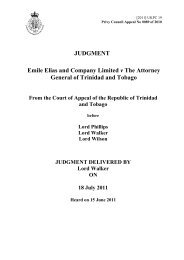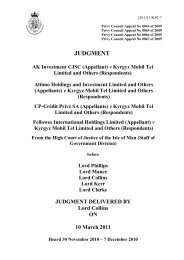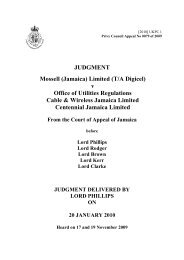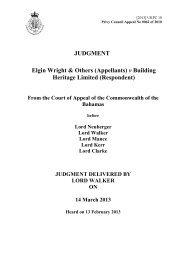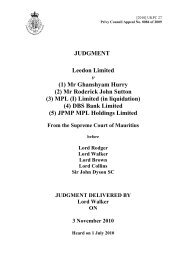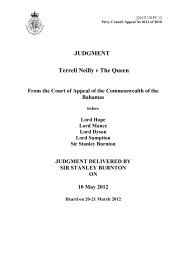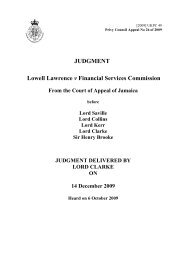Carlos Hamilton and Jason Lewis (Appellants) v The Queen ...
Carlos Hamilton and Jason Lewis (Appellants) v The Queen ...
Carlos Hamilton and Jason Lewis (Appellants) v The Queen ...
You also want an ePaper? Increase the reach of your titles
YUMPU automatically turns print PDFs into web optimized ePapers that Google loves.
PRESS SUMMARY<br />
25 October 2012<br />
<strong>Carlos</strong> <strong>Hamilton</strong> <strong>and</strong> <strong>Jason</strong> <strong>Lewis</strong> (<strong>Appellants</strong>) v <strong>The</strong> <strong>Queen</strong> (Respondent) [2012] UKPC 37<br />
On appeal from: <strong>The</strong> Court of Appeal of Jamaica<br />
JUSTICES: Lord Hope, Lord Kerr, Lord Dyson, Lord Reed <strong>and</strong> Sir Anthony Hooper<br />
BACKGROUND TO THE APPEAL<br />
On 2 April 2001, <strong>Carlos</strong> <strong>Hamilton</strong> <strong>and</strong> <strong>Jason</strong> <strong>Lewis</strong> (the “<strong>Appellants</strong>”) were found guilty of the murder<br />
of Saleem Hines. <strong>The</strong>y were sentenced to life imprisonment <strong>and</strong> ordered to serve 25 years in prison<br />
before being eligible for parole. On 24 March 2003, the Court of Appeal of Jamaica refused the<br />
<strong>Appellants</strong>’ application for permission to appeal against their convictions <strong>and</strong> sentences.<br />
<strong>The</strong> <strong>Appellants</strong> ultimately sought permission to appeal to the Judicial Committee of the Privy Council<br />
(the “JCPC”). Rule 11(2) of the Judicial Committee (Appellate Jurisdiction) Rules Order 2009 provides<br />
that an application for permission to appeal must be filed within 56 days from the date of the order or<br />
decision of the court below or the date of the court below refusing permission to appeal (if later) (the<br />
“56 day rule”). <strong>The</strong> <strong>Appellants</strong> had written to an English solicitor in July 2003 to ask for her help with<br />
their appeals to the JCPC. It was not until April 2010 that she instructed another firm of solicitors who<br />
would represent the <strong>Appellants</strong> in the JCPC proceedings. <strong>The</strong> Respondent’s solicitors were not aware<br />
of the <strong>Appellants</strong>’ wish to appeal until the <strong>Appellants</strong>’ solicitors notified them on 19 July 2011. <strong>The</strong><br />
<strong>Appellants</strong>’ applications for permission to appeal were filed on 29 July 2011, eight years <strong>and</strong> four<br />
months after the order of the Court of Appeal of Jamaica.<br />
Before the JCPC, the <strong>Appellants</strong> advanced various grounds of appeal. Amongst other things, they<br />
criticised the trial judge’s direction to the jury on provocation in relation to <strong>Carlos</strong> <strong>Hamilton</strong> <strong>and</strong> the<br />
trial judge’s failure to admit into evidence certain statements made by <strong>Carlos</strong> <strong>Hamilton</strong> to the police.<br />
<strong>The</strong> <strong>Appellants</strong>’ counsel’s failure at the trial to introduce good character evidence was also founded<br />
upon.<br />
JUDGMENT<br />
On 16 August 2012, the JCPC granted the <strong>Appellants</strong>’ applications for permission to appeal ([2012]<br />
UKPC 31). <strong>The</strong> judgment was given by Lord Hope, who also gave guidance on the JCPC’s approach<br />
to late permission applications in criminal appeals from Caribbean jurisdictions <strong>and</strong> on minimising<br />
delay in filing such applications. <strong>The</strong> JCPC now unanimously dismisses the <strong>Appellants</strong>’ appeals. <strong>The</strong><br />
judgment is given by Sir Anthony Hooper.<br />
REASONS FOR THE JUDGMENT<br />
Permission to Appeal ([2012] UKPC 31)<br />
Decision in this case<br />
<strong>The</strong> Judicial Committee of the Privy Council<br />
Parliament Square London SW1P 3BD T: 020 7960 1886/1887 F: 020 7960 1901 www.jcpc.gov.uk
It was in the interests of justice that the appeals should be heard. Much of the period of delay is<br />
unexplained. However, the case had been h<strong>and</strong>led throughout pro bono, the <strong>Appellants</strong> were<br />
sentenced to very long periods of imprisonment, <strong>and</strong> there was sufficient merit in the grounds of<br />
appeal to justify referring the case for a full hearing. Although the <strong>Appellants</strong>’ first English solicitor is<br />
not to be blamed for what happened, there is every possibility that if she had informed the<br />
Respondent’s solicitors of the <strong>Appellants</strong>’ intention to apply for permission to appeal at the outset the<br />
delay would have been less extreme. [19 <strong>and</strong> 20]<br />
Guidance on late permission applications <strong>and</strong> on minimising delay<br />
<strong>The</strong> JCPC has no intention of departing from the 56 day rule. It has not been suggested that it fails to<br />
meet the st<strong>and</strong>ard under the European Convention. In cases where the Respondent objects to the<br />
lateness of an application for permission, as a general rule, the longer the delay, the more convincing<br />
<strong>and</strong> weighty the Appellant’s explanation for the delay will need to be. <strong>The</strong> circumstances that<br />
contribute to the problem of delay in criminal appeals from the Caribbean are exceptional. <strong>The</strong>se<br />
include limited or a complete lack of legal aid, the need for <strong>Appellants</strong> to rely on pro bono<br />
representation, <strong>and</strong>, in Jamaica, the difficulties of prisoners in communicating with the outside world,<br />
<strong>and</strong> the lack of a procedure for prisoners to be informed of their rights of appeal. But the question for<br />
the JCPC, as when dealing with other late applications for permission, is whether, having regard to all<br />
the circumstances, it is in the interests of justice that the time limit for filing should be extended. [5 – 9<br />
<strong>and</strong> 15 – 17]<br />
Weight will always be given to the merits of the appeal <strong>and</strong> to the severity of the sentence. <strong>The</strong><br />
stronger the case appears to be that the Appellant may have suffered a serious miscarriage of justice,<br />
the less likely it will be that the application for permission will be rejected because it is late. Pro bono<br />
practitioners will be expected to progress their cases as quickly as possible but it would be<br />
unreasonable, given the other dem<strong>and</strong>s on their time, to expect them to adhere to the same exacting<br />
st<strong>and</strong>ards as are expected of remunerated practitioners. [17]<br />
<strong>The</strong> best way of reducing the opportunity for delay lies in the early exchange of information. <strong>The</strong><br />
following steps can <strong>and</strong> should be taken to minimise the risk of unreasonable delay.<br />
<strong>The</strong> prosecuting authorities should be notified as soon as a prisoner has indicated an intention to<br />
apply for permission to appeal. <strong>The</strong> JCPC will expect the prosecuting authorities to provide help<br />
in obtaining as soon as possible the relevant documents.<br />
A copy of the notification should be given to the JCPC Registrar when the application for<br />
permission is filed.<br />
Those who normally act as JCPC agents for the State concerned should be informed at the outset.<br />
<strong>The</strong>y can be expected to offer to help to obtain as soon as possible the relevant documents if<br />
problems are encountered with the prosecuting authorities. [18 <strong>and</strong> 19]<br />
Grounds of Appeal ([2012] UKPC 37)<br />
<strong>The</strong> JCPC identified three errors at the <strong>Appellants</strong>’ trial: 1) the trial judge had misdirected the jury on<br />
the issue of provocation; 2) counsel for the <strong>Appellants</strong> had failed to introduce evidence of the<br />
<strong>Appellants</strong>’ good characters; <strong>and</strong> 3) the trial judge had failed to admit into evidence the statements<br />
made by <strong>Carlos</strong> <strong>Hamilton</strong> to the police at the time of his arrest. [20 – 21, 38 – 40, 43 – 62, <strong>and</strong> 63]<br />
<strong>The</strong> JCPC rejected the <strong>Appellants</strong>’ remaining grounds of appeal. [22 – 24, 25 – 30, 31 – 37, <strong>and</strong> 41 –<br />
42] However, the JCPC dismissed the <strong>Appellants</strong>’ appeals because they were satisfied that, if the errors<br />
had not been made, the verdicts would necessarily have been the same. [64 – 69]<br />
References in square brackets are to paragraphs in the judgment<br />
NOTE<br />
This summary is provided to assist in underst<strong>and</strong>ing the Committee’s decision. It does not form part<br />
of the reasons for that decision. <strong>The</strong> full opinion of the Committee is the only authoritative document.<br />
Judgments are public documents <strong>and</strong> are available at: www.jcpc.gov.uk/decided-cases/index.html.<br />
<strong>The</strong> Judicial Committee of the Privy Council<br />
Parliament Square London SW1P 3BD T: 020 7960 1886/1887 F: 020 7960 1901 www.jcpc.gov.uk



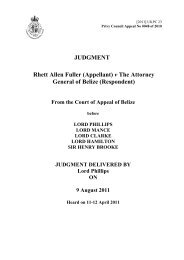
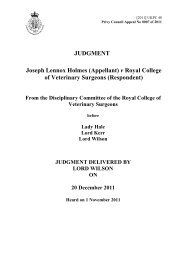
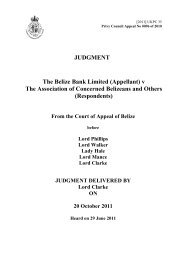
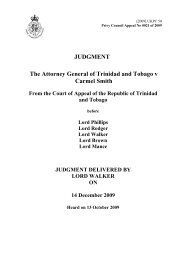
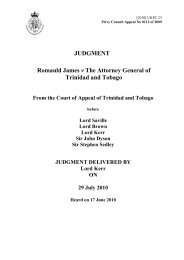
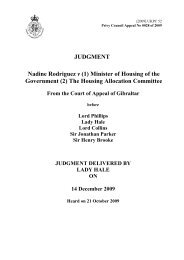
![[2011] UKPC 10 - Judicial Committee of the Privy Council](https://img.yumpu.com/23644185/1/184x260/2011-ukpc-10-judicial-committee-of-the-privy-council.jpg?quality=85)
